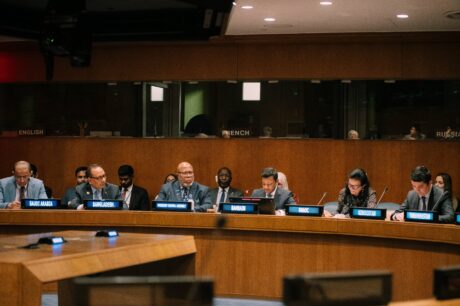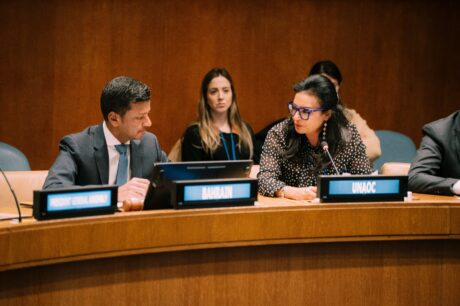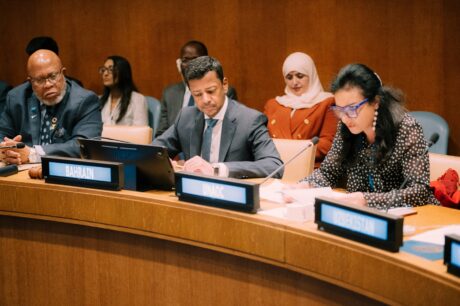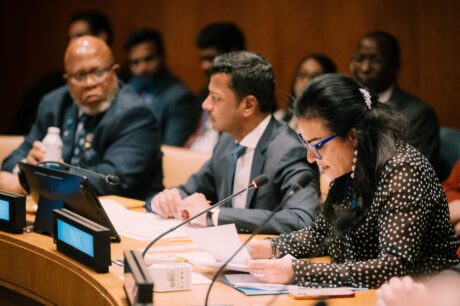Remarks by Ms. Nihal Saad,
Director of United Nations Alliance of Civilizations (UNAOC)
at the International Day of Conscience event entitled
“Harmony in Diversity: Promoting Peaceful Coexistence”
5 April 2024, New York
“We need the power of conscience to stay united.
Now is a time for solidarity, not divisiveness.
Mutual respect, not xenophobia.
Love, not hatred.”
Your Excellency Mr. Dennis Francis,
President of the United Nations General Assembly,
Your Excellency Mr. Jamal Fares Alrowaiei,
Permanent Representative of the Kingdom of Bahrain to the United Nations,
Excellencies and distinguished colleagues,
Ambassador Al Rowaie, the High Representative for the United Nations Alliance of Civilizations conveys his warmest wishes and regrets that he couldn’t be here today.
UNAOC recognizes the Kingdom of Bahrain’s commitment to promoting a Culture of Peace, nurturing compassion and enforcing conscience as core shared values and a way of life.
These are the core values upon which the United Nations Alliance of Civilizations was founded and they also are critical to advancing our shared aim of building just, peaceful and inclusive societies in line with Goal 16 of the 2030 Agenda of Sustainable Development.
As we gather here today to commemorate the International Day of Conscience, conflicts rage in hot spots around the world. It is necessary to recall the UN Charter, which highlights in its preamble the obligations of the United Nations, including:
To save succeeding generations from the scourge of war;
We also remind ourselves of Article 1 of the Universal Declaration of Human Rights: which states that all human beings are born free and equal in dignity and rights and are endowed with reason and conscience and should act towards one another in a spirit of brotherhood.
Tragically, if the events of recent months have taught us anything it is that the fractured world of today feels a world away from these founding principles.
Excellencies,
I would like to invite you to reflect, for a moment, on the meaning of the word “Conscience” and its relevance “Consciousness”.
What is conscience ? The word as it is commonly used in its moral sense, means the inherent sense of every healthy human being to perceive what is right and what is wrong, impelling one towards the right direction. It is the sum of moral and ethical principles that controls, guides, or inhibits the thoughts and actions executed by that individual.
If an individual is guided by their conscience and what it entails of social and moral responsibility then, one’s conscience will lead him/her to the right direction that is to do the common good namely : solidarity, fraternity, compassion and “to love thy neighbour”.
Consciousness on the other hand, is the function and state of awareness of the human mind that receives and processes information, stores it or rejects it”. It is proven that the more information one is able to gather and process, the more aware and the more conscious one becomes regarding one’s internal and external world”.
Awareness and wakefulness represent the 2 main components of consciousness.
Conscience should lead us to the right direction and Consciousness will trigger our awareness of what is morally right and reminds us of our social and moral responsibility towards “our neighbours” in the broader sense that transcends neighbourhoods to cities , countries, and continents so that solidarity, compassion, fraternity prevails for the good of all humanity.
As a leading global platform for dialogue, UNAOC remains steadfast in our commitment to engagement and dialogue across diverse actors, cultures and religions and civilizations, inclusive of all.
We are convinced that platforms such as ours are a testament to the fact that diversity is a strength that can and must be harnessed if we are to forge a path towards building an alliance of peace.
But peace is elusive.
Maintaining and building peace is a dynamic, participatory and, ultimately, self-fulfilling process that respects ethnic, cultural and religious differences, encourages dialogue and transforms conflict into constructive opportunities for cooperation and collaboration.
To put it in another way, peace is not merely the absence of conflict. It is this recognition that that fuels our determination to carry out our initiatives related to prevention and mediation in identity-based conflicts and to address all forms of religious hatred and especially Islamophobia, antisemitism and prejudice against members of minority religions.
These values guided our development of the United Nations Plan of Action to Safeguard Religious Sites, launched by the United Nations Secretary-General in 2019. Rooted in the Universal Declaration of Human Rights, the Plan advocates the sanctity and universality of religious sites and safety of worshippers and underlines the right of all believers to access holy sites and to practice their religious rituals and traditions freely, peacefully, and safely without fear or intimidation.
As you are aware, the implementation of several components of this Plan rests with the political and financial support of member states.
We also promote these values every day through the delivery of our portfolio of projects and programmes in the priority areas of youth, education, media, migration and women as peace mediators.
Our activities and initiatives are designed to facilitate a global conversation on the challenges of and opportunities associated with living in a landscape of cultural, religious and civilizational diversity in an age of accelerated global communication.
We need the power of conscience to stay united.
Now is a time for solidarity, not divisiveness. Mutual respect, not xenophobia. Love, not hatred.
I thank you.




